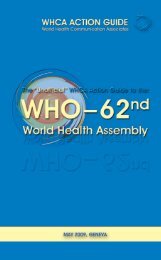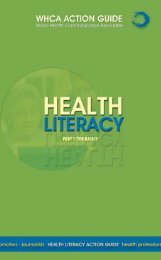the basics - World Health Communication Associates
the basics - World Health Communication Associates
the basics - World Health Communication Associates
- No tags were found...
Create successful ePaper yourself
Turn your PDF publications into a flip-book with our unique Google optimized e-Paper software.
4.6 POLICY-MAKING ARENASPolicies at all levels—institutional, community, national and regional—shape <strong>the</strong>factors which determine health literacy and health. The engagement of citizensin policy-making processes is a fundamental democratic principle. Fur<strong>the</strong>rmore,a key trend in many health system reforms is empowerment of patients and <strong>the</strong>development of more patient-centred care. To function effectively in politics andpolicy-making, people need <strong>the</strong> ability to advocate for policy change; be activecitizens (for example, have a vote); be knowledgeable about health rights andresponsibilities; and be able to participate in health organisations.ChallengesFinancial crisisThe world is confronting a severe financial crisis at a time when it is also facing majorenergy and environmental problems and wide social inequalities. While <strong>the</strong> crisis hasglobal roots, its impact is already being felt unequally between regions and countries(WHO 2009). Many experts point to long-lasting consequences for health all over <strong>the</strong>world. The crisis may lead to an opportunity to trigger significant changes in socialnorms, lifestyles and health-related behaviours or it could lead to a widening of socialinequalities and fur<strong>the</strong>r health literacy disparities.Social determinants and health inequitiesThe Commission on <strong>the</strong> Social Determinants of <strong>Health</strong> (CSDH 2008) makes a strongcase for <strong>the</strong> root causes of health and health literacy inequities as being based onstructural societal factors, such as income differentials, lack of social protection oruniversal health care access. They call for society-wide action to address <strong>the</strong>se factorsand to reduce differential exposures to risks, differential vulnerabilities to both acuteand chronic disease, and differential outcomes of care that poorer people in everycountry experience on a socially determined gradient. This social health gradientmeans that each successive social class is worse off with regards to <strong>the</strong>ir health than<strong>the</strong> class just above <strong>the</strong>m.Numerous studies (see section 2 above) demonstrate that poor health literacyskills are associated with a wide variety of negative health outcomes. Fur<strong>the</strong>rmore,studies point to clear social class differences in health literacy skills (Kickbusch et al.2008). The CSDH does not deal directly with <strong>the</strong> issue of health literacy in <strong>the</strong>ir report.The relationship of health literacy to socially determined inequities is an importantarea for fur<strong>the</strong>r study. This guide sees health literacy as a differential capacity that54SECTION 4: WHAT CAN WE DO TO STRENGTHEN HEALTH LITERACY?






